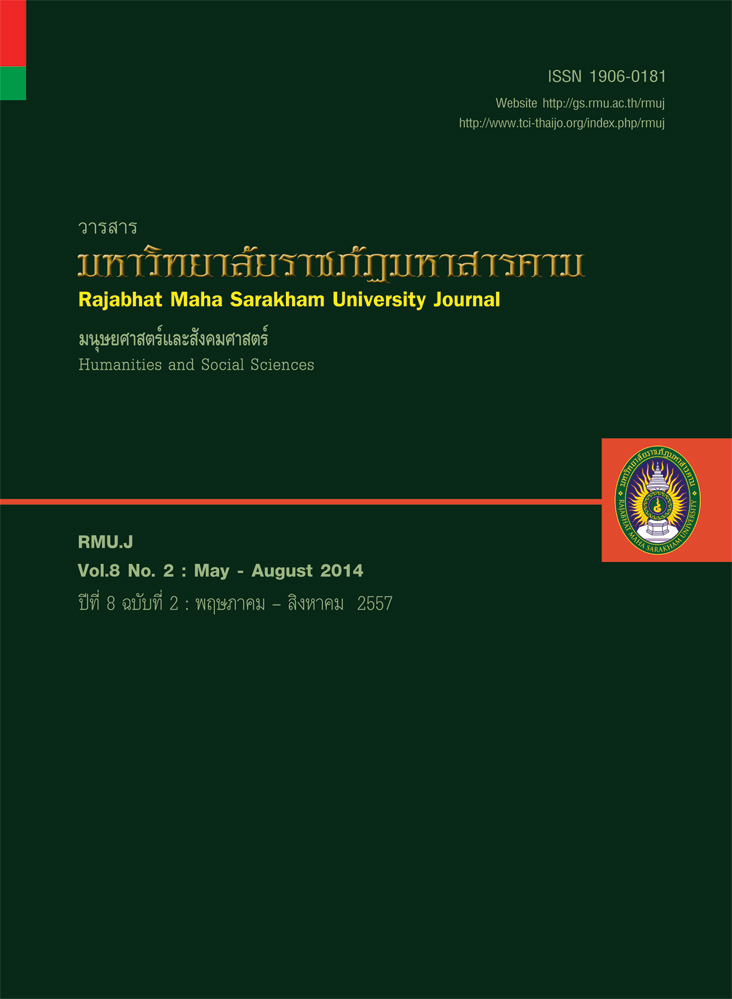The Development of PBL Teaching Method for Teaching English Conversation
Main Article Content
บทคัดย่อ
การวิจัยนี้เป็นการบูรณาการทฤษฎีการสอนโดยใช้ปัญหาเป็นฐานและการออกแบบระบบการเรียนการสอนในการจัดการเรียน
การสอนวิชาภาษาอังกฤษ ซึ่งมีวัตถุประสงค์ ประการแรก เพื่อพัฒนาแผนการสอนโดยใช้ทฤษฎีการใช้ปัญหาเป็นฐาน ในการจัดการ
เรียน การวิชาภาษาอังกฤษสำหรับชีวิตประจำวันโดยพัฒนาขึ้นมาจากโมเดลการใช้ปัญหาเป็นฐาน ประการที่สอง เพื่อเปรียบเทียบคะแนน
สอบ ภาษาอังกฤษ เพื่อการสื่อสาร ระหว่างก่อนและหลังเรียนโดยใช้วิธีการสอนโดยใช้ปัญหาเป็นฐานและผลสัมฤทธิ์ ทางการเรียนใน
รายวิชา ภาษาอังกฤษเพื่อการสื่อสารในชีวิตประจำวัน และประการที่สาม เพื่อศึกษาทัศนคติของนักศึกษาที่เรียนวิชาภาษาอังกฤษ สำหรับ
ชีวิต ประจำวันโดยใช้วิธีการสอนโดยใช้ปัญหาเป็นฐาน ดำเนินการวิจัยด้วยการทดลองแบบกึ่งทดลง กลุ่มตัวอย่างในการศึกษาครั้งนี้
คือ นักศึกษาในระดับปริญญาตรี โปรแกรมวิชา ระบบสารสนเทศทางคอมพิวเตอร์ มหาวิทยาลัยเทคโนโลยีราชมงคลอีสาน วิทยาเขต
กาฬสินธุ์ จำนวน 72 คน ผลการวิจัยพบว่า
วิธีการสอนโดยการบูรณาการทฤษฎีการใช้ปัญหาเป็นฐานที่พัฒนาขึ้นจากโมเดลการใช้ปัญหาเป็นฐานมีประสิทธิภาพตามเกณฑ์
80/80 นอกจากนั้นผลการศึกษายังพบว่า นักศึกษามีคะแนนสอบภาษาอังกฤษเพื่อการสื่อสารโดยใช้วิธีการสอน โดยใช้ปัญหาเป็นฐาน
หลังเรียนสูงกว่าก่อนเรียนอย่างมีนัยสำคัญที่ระดับ 0.05 และผลสัมฤทธิ์ทางการเรียนในรายวิชาภาษาอังกฤษ เพื่อการสื่อสารในชีวิต
ประจำวันของนักศึกษากลุ่มทดลองสูงกว่านักศึกษาของกลุ่มควบคุม สุดท้ายผลการศึกษาชี้ให้เห็นว่านักศึกษา มีทัศนคติที่ดีมาก
ต่อการเรียนวิชาภาษาอังกฤษสำหรับชีวิตประจำวันโดยใช้วิธีการสอนโดยใช้ปัญหาเป็นฐาน ดังนั้นอาจกล่าวได้ว่าวิธีการสอนโดย ใช้ปัญหา
เป็นฐานที่ ผู้วิจัยพัฒนาขึ้นนี้มีประสิทธิภาพที่จะนำไปใช้ในการสอนวิชาภาษาอังกฤษเพื่อการสื่อสารได้
This study integrates Problem-Based Learning (PBL) and Instructional System Design principles into
English language teaching. The three main purposes of this quasi-experimental study were 1) to develop
effective lesson plans based on Problem-Based Learning for teaching English Conversation for a Daily Life
Course, 2) to compare the students’ pre and post-test scores of the English Conversation Test and learning
achievement of the English Conversation for Daily Life Course, and 3) to investigate the students’ attitudes
towards learning through PBL Instruction. The subjects were 72 Computer Information System undergraduate
students at Rajamangala University of Technology Isan, Kalasin Campus. They were separated into two
groups, namely experimental and control. The results revealed that the PBL teaching method developed from
the PBL Model was effective for teaching English Conversation for the Daily Life course according to the 80/80
standard. The students’ post-test score of the English Conversation Test was significantly higher than that of the pre-test at the 0.05 level, and the students’ learning achievement score of the experimental group in
learning English Conversation for Daily Life Course was higher than that of the control group who learned
through the traditional teaching method. Finally, students revealed a very positive attitude towards learning
through use of the PBL method. Thus, it can be said that the PBL method in this study is effective and can
be used in English language teaching.
Article Details
1. บทความที่ลงตีพิมพ์ทุกเรื่องได้รับการตรวจทางวิชาการโดยผู้ประเมินอิสระ ผู้ทรงคุณวุฒิ (Peer Review) สาขาที่เกี่ยวข้อง อย่างน้อย 3 ท่าน ในรูปแบบ Double blind review
2. ข้อคิดเห็นใด ๆ ของบทความที่ลงตีพิมพ์ในวารสารมหาวิทยาลัยราชภัฏมหาสารคาม นี้เป็นของผู้เขียน คณะผู้จัดทำวารสารไม่จำเป็นต้องเห็นด้วย
3. กองบรรณาธิการวารสารมหาวิทยาลัยราชภัฏมหาสารคาม ไม่สงวนสิทธิ์การคัดลอกแต่ให้อ้างอิงแสดงที่มา


